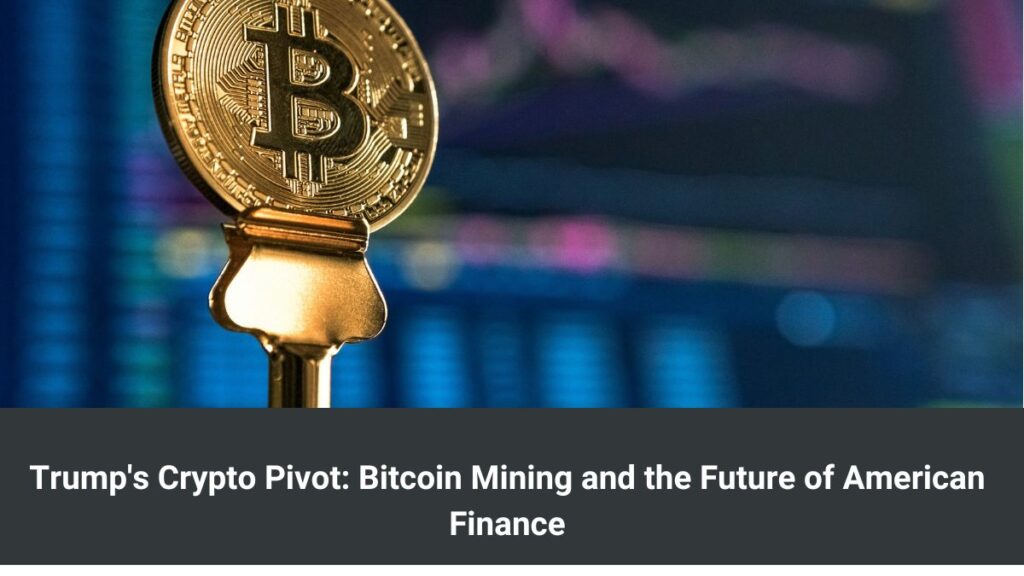In the gilded halls of Mar-a-Lago, where opulence meets political strategy, an unexpected conversation unfolded this Tuesday evening. Former President Donald Trump, known for his bold statements and unapologetic stances, sat down with a group that might have seemed out of place just a few years ago: Bitcoin miners. This meeting, which has sent ripples through both the political and cryptocurrency spheres, marks a significant shift in Trump’s rhetoric on digital assets and could herald a new chapter in the relationship between American politics and the burgeoning world of crypto.
The Mar-a-Lago Meeting: A Turning Point
From Skeptic to Supporter?
Trump’s journey with cryptocurrency has been anything but linear. In the past, he’s been quoted expressing skepticism about Bitcoin and its ilk, famously tweeting in 2019 that he was “not a fan” of cryptocurrencies, which he saw as “not money” and “based on thin air.” Yet, on Tuesday night, attendees like Matthew Schultz, executive chairman at CleanSpark Inc., painted a very different picture. According to Schultz, Trump professed not only to love cryptocurrency but to understand it—a remarkable evolution for a figure who once viewed the digital asset space with marked wariness.
Energy and Economics: The Bitcoin Mining Pitch
In a world grappling with energy crises and the looming specter of climate change, Trump’s reported comments on Bitcoin mining’s role in grid stabilization are particularly noteworthy. “Bitcoin miners help to stabilize energy supply from the grid,” Schultz recounted Trump saying. This perspective aligns with arguments made by mining advocates who contend that their operations can act as a “battery in reverse,” soaking up excess energy during low-demand periods and throttling back when the grid is strained.
It’s a compelling narrative, especially for a former president who championed American energy independence and often criticized renewable energy sources for their perceived unreliability. In Bitcoin mining, Trump may see a technological ally that bolsters traditional energy sectors while embracing innovation—a rare bridge between old and new economies.
The Political Calculus: Courting the Crypto Vote
A New Demographic in Play
Trump’s overtures to the crypto community aren’t occurring in a vacuum. With the 2024 presidential race already heating up, candidates are scrambling to connect with new voter blocs. The cryptocurrency demographic—young, tech-savvy, and often libertarian-leaning—represents a tantalizing prize. By pledging to be an “advocate for miners in the White House,” as Schultz reports, Trump is making a direct play for this group’s support.
His recent actions underscore this strategy. At a Libertarian Party convention, Trump promised to commute the sentence of Ross Ulbricht, the Silk Road founder whose case has become a cause célèbre in certain crypto circles. He’s also now accepting campaign donations in cryptocurrency, a move that both legitimizes digital assets and taps into a new vein of political funding.
The Musk Factor and MAGA Memes
No discussion of Trump’s crypto evolution would be complete without mentioning Elon Musk. Trump acknowledged taking advice on the subject from the Tesla CEO, a nod that carries weight given Musk’s outsized influence in both tech and crypto communities. This alliance of maverick billionaires adds a layer of star power to Trump’s crypto pivot—and provides fodder for the kind of viral moments that defined his previous campaign.
Indeed, Trump seems to be leaning into the meme-ability of it all. His Truth Social post declaring that he wants all remaining Bitcoin to be “MADE IN THE USA!!!” reads like a rallying cry tailored for retweets and Reddit threads. It’s a canny fusion of his trademark economic nationalism with the decentralized, borderless ethos of cryptocurrency.
Crypto Mining: The New Political Battleground
Democrats vs. Republicans: A Growing Divide
As Trump cozies up to miners, the partisan lines around cryptocurrency are becoming increasingly defined. Democrats, led by figures like Senator Elizabeth Warren, have been pushing for greater scrutiny of Bitcoin mining’s environmental impact and energy consumption. Their concerns are not unfounded; the process of mining Bitcoin is energy-intensive, with some studies suggesting it uses more electricity annually than many countries.
In contrast, Republicans like Texas Senator Ted Cruz have positioned themselves as champions of the industry, arguing that it drives innovation and can actually incentivize the development of renewable energy sources. Trump’s latest comments place him firmly in this camp, setting the stage for crypto policy to become yet another flashpoint in America’s polarized political landscape.
The Specter of CBDCs and Financial Freedom
Perhaps the most intriguing aspect of Trump’s Mar-a-Lago remarks was his framing of Bitcoin mining as “our last line of defense against a CBDC.” Central Bank Digital Currencies have become a bogeyman for many in the crypto world, who fear they could give governments unprecedented control over individuals’ financial lives. By casting Bitcoin as a bulwark against such overreach, Trump is tapping into deep-seated anxieties about privacy and state power—themes that resonate across the political spectrum but particularly with his base.
Looking Ahead: Implications and Questions
As the dust settles on the Mar-a-Lago meeting, several questions loom large. Is Trump’s embrace of Bitcoin mining a genuine conversion or a calculated political maneuver? Can the energy-hungry process of crypto mining be reconciled with growing demands for sustainability? And how might a potential Trump presidency shape the regulatory landscape for digital assets?
What’s clear is that cryptocurrency has arrived as a political force. The presence of industry leaders like Jason Les, CEO of Riot Platforms Inc., at high-level meetings with presidential contenders speaks volumes. So too does the growing influence of crypto-focused PACs like Fairshake, which are channeling ever-greater donations toward crypto-friendly candidates.
A New Chapter for American Innovation?
In many ways, the story of Bitcoin mining in America is a quintessentially American tale. Since China’s industry ban in 2021, the U.S. has become the global hub for mining activity—a digital gold rush playing out across server farms from Texas to New York. Trump’s call for Bitcoin to be “MADE IN THE USA” taps into this narrative of reinvention and resilience.
Yet, as with any frontier, the territory comes with its share of conflicts. Local communities have raised alarms about miners straining power grids and driving up electricity costs. Environmental groups worry about the sector’s carbon footprint. Balancing these concerns with the potential economic benefits of a thriving crypto industry will be a defining challenge for policymakers in the years ahead.
The Mainstreaming of a Movement
Tuesday’s meeting at Mar-a-Lago may well be remembered as a watershed moment—the day cryptocurrency stepped out of the shadows and onto the main stage of American politics. For better or worse, Bitcoin and its brethren are no longer fringe curiosities but serious factors in the calculus of power.
As we hurtle toward another momentous election, voters would do well to look beyond the slogans and memes to the substance of candidates’ crypto policies. The decisions made in the next few years could determine not just the fate of Bitcoin mining in America, but the very nature of our financial system and the values it embodies.
In the end, perhaps that’s what Trump’s “MADE IN THE USA” quip is really about—not just the physical location of mining rigs, but the principles that will guide our digital future. Will it be one of decentralization and individual empowerment, or centralized control? Of innovation and risk-taking, or cautious regulation? These are the stakes as cryptocurrency enters the political mainstream.
The miners have left Mar-a-Lago, but the conversation they started is just beginning. It’s a dialogue that will reverberate from campaign rallies to Congress, from Wall Street to Main Street. And like the blockchain itself, its outcomes will be shaped not by any one player, but by the collective actions of a nation grappling with the promise and perils of a technology that knows no borders.

